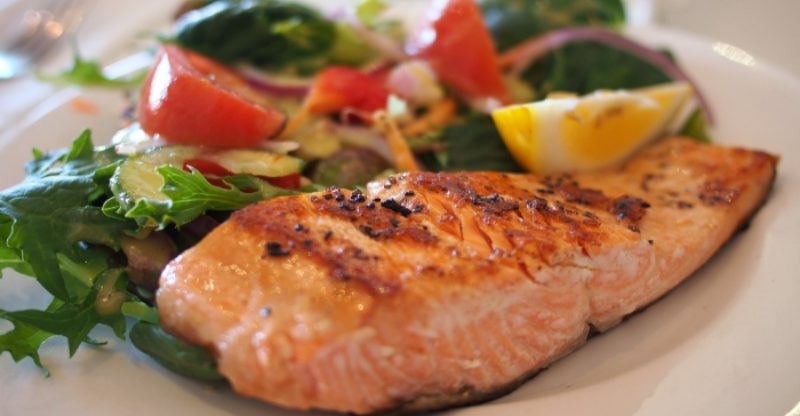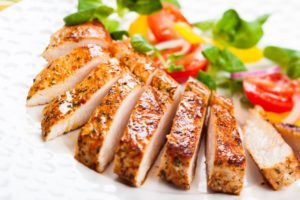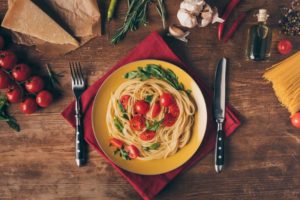How To Choose Foods That Help You Sleep Through The Night
Table Of Contents
- Intro: Foods That Help You Sleep at Night
- Can Food Really Help You Sleep?
- Great Food Combinations
- Foods to Avoid Before Bed Time
- Healthy Bedtime Snacks to Help You Sleep Better
- The Benefits of Keeping a Food Journal
- Final Take-a-ways
- Video: Can You Lose Weight In Your Sleep?
Foods That Help You Sleep at Night
 There are times when we’re unable to sleep. When it happens, we typically go about the usual methods of beating our insomnia by getting over-the-counter or prescription sleep aids, or going on the internet to look up ways to fall asleep.
There are times when we’re unable to sleep. When it happens, we typically go about the usual methods of beating our insomnia by getting over-the-counter or prescription sleep aids, or going on the internet to look up ways to fall asleep.
However, you might be surprised to learn that there is a simpler solution to this problem than you would think: your food.
It’s typical to joke about feeling sleepy after eating the turkey on Thanksgiving, but there is indeed truth to this joke.
There are foods that can help you sleep, just as there are foods that are likely to keep you awake. So if you can’t sleep, think about what you’re eating to see if that’s where your problems – and solutions – lie.
Can Food Really Help You Sleep?
Just like there are foods that will keep you up,there are foods that help you sleep because of the chemical reactions they cause in the brain. Turkey is one such food because it is a known source of tryptophan.
Tryptophan is an amino acid that is used by your body to help produce serotonin and melatonin which help calm the brain down and, as a result, help you go to sleep.
Since tryptophan is an amino acid, this means we can’t produce it naturally, and as a result we need to ingest it in order to help us create serotonin and melatonin.
In other words, certain foods are necessary to help us cool down.
When you eat foods containing tryptophan, it is best to eat it with foods rich in carbohydrates. Carbs help the body release insulin, causing your body to absorb amino acids like tryptophan and release them into your bloodstream, helping you go to sleep.
Compare this to protein-rich foods, which contain tyrosine, another amino acid. However, unlike tryptophan, tyrosine promotes alertness and increased mental activity.
Because of this, it is important to monitor your intake of foods loaded with protein if you want to increase you chances of being able to sleep.
Great Food Combinations
Speaking of combining different foods for sleep, it’s important to craft food combos that help you function through the day.
For example: while you pair tryptophan with carbs at night to help you go to sleep better, you can also pair carbs with proteins in order to increase your alertness during the day.
When it comes to helping you sleep, one good idea is to add calcium to your evening meal through milk. This is because calcium helps the brain convert tryptophan to melatonin. This is where the idea of having a warm glass of milk before bed comes from.
When searching for foods rich in tryptophan besides turkey, you need not worry – the list is plentiful. Milk, cheese, fruits, nuts, vegetables, legumes, seeds, and grains, as well as foods like eggs, tofu, and salmon, are all great sources of this particular amino acid.
This would mean that excellent ideas for late-night snacks would include bowls of whole-grain cereal, or fruits like apples or bananas and a glass of milk.
There’s a multitude of combinations you could create for effective evening meals. Dishes like chili, or steak and vegetables, or Chicken Alfredo are all great ideas. However, it’s important not to overeat, as it could cause your digestive system to keep working while you’re trying to sleep.
Foods to Avoid Before Bed Time
As stated before, foods such as those with a high protein content should be avoided before bedtime because they contain tyrosine, which increases mental activity.
These aren’t the only foods to avoid, as there are a wide variety of other foods that can prevent you from going to sleep. Perhaps the most obvious examples are foods with caffeine in them.
Caffeine is a stimulant that increases adrenaline and inhibits the necessary chemical processes in the brain – this is why people ingest it through coffee to wake them up in the morning.
However, it’s not just coffee that contains caffeine – it’s also found in tea, chocolate, soft drinks, and even certain drugs.
The list of foods that won’t help when trying to sleep doesn’t just end there, however. Among the other foods to avoid are alcohol, fatty foods, spicy foods, grapefruit. Alcohol may help you doze off initially, but it actually affects later stages of sleep due to its effects on the brain.
Fatty foods mess with the production of orexin, a brain chemical that regulates both hunger and your internal clock.
Spicy foods not only induce heartburn but also alter your body temperature, confusing the brain as it signals certain changes to help sleep. Lastly, grapefruit – as well as other citrus fruits – cause acid reflux and can keep you from sleeping.
7 Healthy Bedtime Snacks to Help You Sleep Better
Below is a list of 7 foods proven to help you sleep better at night. Try these bedtime snacks just before bed:
- Almonds
- Bananas
- Grapes
- Herbal Tea
- Honey
- Milk
- Oats
Almonds are considered a healthy snack anytime of the day. What you may not know is that they also contain melatonin. Experts say that melatonin has a relaxing effect on the body helping you fall asleep.
Bananas have potassium which has been known to help with lowering blood pressure. Bananas also contain magnesium and tryptophan, which helps your body relax, allowing you to sleep.
Grapes are good for more than making wine. Grapes are one of the only fruits that have melatonin, which helps you relax. A regular diet of grapes will help you fall asleep faster.
Herbal Tea have been used by people all over the world as a natural sleep aid. Unlike natural teas, which comes from black tea, herbal teas come from the processing and boiling of various herbs and spices. So the next time you can’t sleep, try a cup of chamomile, passion flower or lemon balm herbal tea.
Honey… Yes, honey! Honey is a food substance made by bees as part of the plant pollination process. This sweet golden liquid increases serotonin in the body. Serotonin helps you to naturally de-stress and relax, allowing you to sleep better.
Milk has been rumored to help us sleep better. This is because milk contains calcium, melatonin as well as tryptophan. These all have a relaxing effect on the body and brain. So the next time you feel the urge for a snack during bedtime, why not have a glass of warm milk.
Oats are a natural source of melatonin. Melatonin helps to put the body at ease. Oatmeal, especially with warm milk added, will help you begin to sleep better at night.
The Benefits of Keeping a Food Journal
One way that helps greatly when dealing with dietary troubles is keeping a food journal.
When you’re in the process of trying to figure out what foods to eat and when, a journal is handy for keeping track of what foods affect your slumber the most.
With your journal, you can pick the foods that tend to prevent you from sleeping to an earlier time in the day.
Likewise foods that help you sleep through the night should be eaten later in the evening before going to bed. With the help of a food journal, you can plan out your dietary needs to ensure that you get the best results.
Final Take-a-ways
Food is actually one of the major factors in whether or not we are able to sleep. We often take what we eat for granted, unaware of how much they impact our bodies on a chemical level.
Hopefully, with this knowledge, you can be better prepared to have a good night’s sleep. So don’t waste money on certain drugs, and don’t worry about undergoing intensive mental conditioning. If you are mindful of what you eat, you will be sleeping like a baby in no time.
Lose Weight In Your Sleep?
You can lose weight while you’re sleeping with this!





